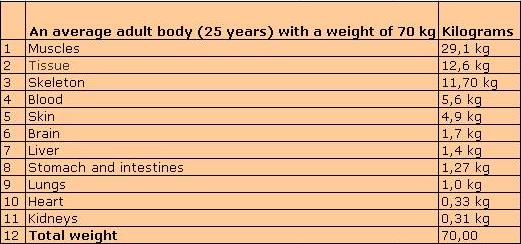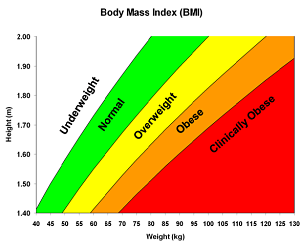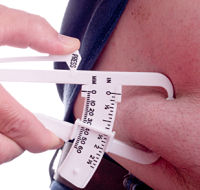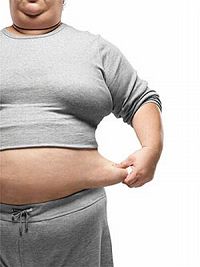
OBESITY
In affluent countries, the problem with overweight (and obesity) has dramatically increased in recent years. Overweight (and obesity) is currently one of the most important health problems.
Obesity occurs when a person consumes more calories than he or she burns. The excess energy in the body is stored in the form of fat.
Obesity occurs when a person consumes more calories than he or she burns. The excess energy in the body is stored in the form of fat.
In the Netherlands approximately 51% of men and approximately 42% of women are overweight. In children 14.5% of boys and 17.5% of girls are overweight or even obese. The number of adolescents that are overweight increases alarmingly. Research has shown, that not eating breakfast plays a role. Pupils who do not eat breakfast in the morning, are usually fatter than children who do. The social importance of healthy nutrition in this context is very important. There are various synonyms for overweight such as obesity, fat, pudgy, adiposity.
Below shows the top 5 unhealthy snacks
Obesity brings increased health risks with it. Besides physical problems such as overloading of knees, difficulty in breathing and psychosocial problems, fat people also have an increased risk of developing chronic diseases. One speaks of the "metabolic syndrome" when multiple risk factors for heart disease occur. For example, hypertension, arthritis, abnormal fat levels in the blood and alleviated fasting blood glucose. This increased blood glucose caused by a decreased sensitivity of the body to insulin (a hormone produced by the pancreas,created to regulate blood glucose levels). The metabolic syndrome is thus also a precursor of type 2 diabetes mellitus. In overweight adults, the metabolic syndrome is more frequently than in children.
Research has shown that overweight increases the risk of metabolic syndrome and certain forms of cancer. In short, obesity is associated with a cluster of the diseases such as hypertension, diabetes, arthritis, arteriosclerosis, coronary heart disease and cancer.
Research has shown that overweight increases the risk of metabolic syndrome and certain forms of cancer. In short, obesity is associated with a cluster of the diseases such as hypertension, diabetes, arthritis, arteriosclerosis, coronary heart disease and cancer.
There are many ways to get more exercise, for example:
• stretch well after getting up in the morning
• walk or cycle to the store
• take the stairs instead of the elevator or escalator
• cycle to work instead of driving
• Park your car further away from the office or supermarket
• do gymnastic exercises while watching tv.
Regular exercise can dissipate fatigue and depression, control body weight and stimulate the
digestive system. Recent research has clearly demonstrated that regular exercise can lower
cholesterol levels and can improve heart function. Numerous studies prove that 30 minutes of
daily exercise significantly reduces the risk of weight gain. Walking is good for the circulation
and digestion. Walking has a beneficial effect on constipation, elevated cholesterol levels, high
blood pressure and cellulite. Running and jogging are good for the condition and deeper
breathing. By jogging we train the heart muscle.
Overview of different physical activities and energy
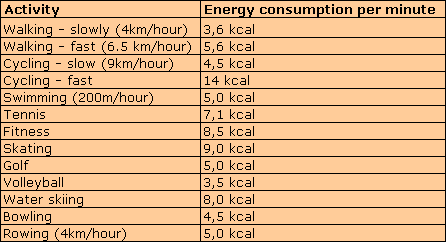
When starting a training routine, increase the sessions gradually. The heart, lungs and muscles need to adapt gradually. Should you decide to start running, you must first start by just walking. Gradually increases the distance of your walks and walk faster. Then you can slowly start running, where you gradually increase your speed.
People who never exercise must build it up over a period of 5 weeks as given below.
• Week 1: 10 minutes fast walking or cycling every day
• Week 2: 15 minutes fast walking or cycling every day
• Week 3: 20 minutes fast walking or cycling every day
• Week 4: 25 minutes fast walking or cycling every day
• Week 5: 30 minutes fast walking or cycling every day
People who never exercise must build it up over a period of 5 weeks as given below.
• Week 1: 10 minutes fast walking or cycling every day
• Week 2: 15 minutes fast walking or cycling every day
• Week 3: 20 minutes fast walking or cycling every day
• Week 4: 25 minutes fast walking or cycling every day
• Week 5: 30 minutes fast walking or cycling every day
Did you know that physical activity is the best medication against fatigue, especially when you feel tired? By exercising at the end of a gruelling day, you feel fresher and fitter again.

Copyright © 2013 All rights reserved. Dietician/Nutritionist Khan - Sitemap
WebDen Website Design en Hosting - Website ontwerp door: www.designer-dragonfly.nl
WebDen Website Design en Hosting - Website ontwerp door: www.designer-dragonfly.nl


Table
Weight of internal and external organs of an average adult
Weight of internal and external organs of an average adult
The degree of obesity is indicated by the Body Mass Index (BMI), also called Quetelet index: Body weight in kilograms divided by the body height in squared meters. In addition, waist circumference (abdominal fat) is a clear indication of obesity. It is important to lose weight when the waist circumference:
• in men: 102 cm or more
• in women: 88 cm or more
The Body Mass Index is the most useful measure for overweight and obesity. The Body Mass Index is expressed in kg/m2.
• Underweight BMI < 18,5 kg/m2
• Normal weight BMI 18,5 - 24,9 kg/m2
• Overweight BMI 25,0 - 29,9 kg/m2
• Obese BMI 30 kg/m2
If we weigh ourselves, then we weigh both the internal and the external organs.
• in men: 102 cm or more
• in women: 88 cm or more
The Body Mass Index is the most useful measure for overweight and obesity. The Body Mass Index is expressed in kg/m2.
• Underweight BMI < 18,5 kg/m2
• Normal weight BMI 18,5 - 24,9 kg/m2
• Overweight BMI 25,0 - 29,9 kg/m2
• Obese BMI 30 kg/m2
If we weigh ourselves, then we weigh both the internal and the external organs.
The causes of overweight
There is not one specific cause of obesity. However it is, the result of a disrupted energy balance. How much energy a person needs per day, is largely determined by the body composition and level
of physical activity.
A surplus of energy is stored in the human body in the form of adipose tissue. Now the question is why some people get fat easier than others. This may include several factors: heredity, the level of metabolic process and frequency of exercise. Several studies have shown that psychological, biological, social, cultural and environmental factors influence the genetic risks enhance, reduce or completely off. Heredity may play a role, the risk of obesity is less than 10% if both parents have a normal or low body weight. The risk of obesity is almost 40% if one parent is overweight and the risk almost 80% if both parents are overweight.
Some people have more appetite when they are restless, tense, unhappy, gloomy, sad, alone or lonely. In some people, the appetite disappears if they are restless, sad, alone or tense.
In the name of science, I would like to explain some of the causes of obesity. The natural processes have ensured that our ancestors energy was better stored in the body in the form of fat due to famine. Our ancestors were hunters who had to save all their energy in order to be able to search for their next prey (food) and did not eat every day. Work has changed a lot, but we still have the same genes. The current lack of movement is mainly due to the steady advance of automation, reducing labour actions required and the motorization of transport decreasing our need to walking and cycling. Another cause is the increase in mechanization of work which means we do less physical work.
Numerous studies have shown that overweight people are more inclined to eat in the evening than in the morning. Because our social lives start in the evening, the evening meal has become more important while breakfast and lunch are neglected.
It has been noted that many young people after their thirties, are inclined to put on about 5 kg to 10 kg extra, for no apparent reason. It may be that the brain no longer secretes enough growth hormones. Besides different effects, the growth hormone stimulates the lipolysis process and the muscle building growth hormone in the body. As the secretion of growth hormone decreases so the breaking down process slows down.
In the absence of organic or mental disorders, the cause of obesity should be sought in the diet. After the Second World War in the increasingly prosperous countries more "expensive" lipid-rich foods of animal origin, "elegant" white bread and refined sugars were consumed. The result is that the mass absorption of calories, cholesterol and saturated fats significantly increased in these countries. In some parts of the world, because of their traditions and culture, obesity was seen as a symbol of wealth, power and beauty.
In educating how to prevent obesity, the emphasis is on sufficient exercise and a sensible diet. Sufficient exercise and a good varied diet forms good principles for a healthy weight.
There is not one specific cause of obesity. However it is, the result of a disrupted energy balance. How much energy a person needs per day, is largely determined by the body composition and level
of physical activity.
A surplus of energy is stored in the human body in the form of adipose tissue. Now the question is why some people get fat easier than others. This may include several factors: heredity, the level of metabolic process and frequency of exercise. Several studies have shown that psychological, biological, social, cultural and environmental factors influence the genetic risks enhance, reduce or completely off. Heredity may play a role, the risk of obesity is less than 10% if both parents have a normal or low body weight. The risk of obesity is almost 40% if one parent is overweight and the risk almost 80% if both parents are overweight.
Some people have more appetite when they are restless, tense, unhappy, gloomy, sad, alone or lonely. In some people, the appetite disappears if they are restless, sad, alone or tense.
In the name of science, I would like to explain some of the causes of obesity. The natural processes have ensured that our ancestors energy was better stored in the body in the form of fat due to famine. Our ancestors were hunters who had to save all their energy in order to be able to search for their next prey (food) and did not eat every day. Work has changed a lot, but we still have the same genes. The current lack of movement is mainly due to the steady advance of automation, reducing labour actions required and the motorization of transport decreasing our need to walking and cycling. Another cause is the increase in mechanization of work which means we do less physical work.
Numerous studies have shown that overweight people are more inclined to eat in the evening than in the morning. Because our social lives start in the evening, the evening meal has become more important while breakfast and lunch are neglected.
It has been noted that many young people after their thirties, are inclined to put on about 5 kg to 10 kg extra, for no apparent reason. It may be that the brain no longer secretes enough growth hormones. Besides different effects, the growth hormone stimulates the lipolysis process and the muscle building growth hormone in the body. As the secretion of growth hormone decreases so the breaking down process slows down.
In the absence of organic or mental disorders, the cause of obesity should be sought in the diet. After the Second World War in the increasingly prosperous countries more "expensive" lipid-rich foods of animal origin, "elegant" white bread and refined sugars were consumed. The result is that the mass absorption of calories, cholesterol and saturated fats significantly increased in these countries. In some parts of the world, because of their traditions and culture, obesity was seen as a symbol of wealth, power and beauty.
In educating how to prevent obesity, the emphasis is on sufficient exercise and a sensible diet. Sufficient exercise and a good varied diet forms good principles for a healthy weight.
Effects on health:
Various studies have shown, that fluctuations of the body weight increase the risk of gallstones in men. In 1980 the Canadian Dr. A. Hoffer wrote in his book "Nutrients to age without senility" about refined sugar and the risk factor for dementia. A high consumption of sugar or sugar concentrated products, causes a deficiency of vitamin B1 (thiamine). This vitamin is essential for sugar metabolism. An excessive intake of alcohol, can also cause a vitamin B1 deficiency. People who are grossly overweight are more likely to get sick and die prematurely. Being overweight also affects the cholesterol levels and blood pressure. In general the risks of obesity are:
• heart disease
• high blood pressure
• high cholesterol levels
• diabetes mellitus
• gall bladder diseases
• stomach and colon cancer
• breast cancer
• back problems
• joint problems eg: -osteoarthritis in the hands, feet and knees
• gout
• sleep disorders such as snoring
• breathing problems
• shortness of breath
• psychosocial issues eg: negative self image, less self respect.
Various studies have shown, that fluctuations of the body weight increase the risk of gallstones in men. In 1980 the Canadian Dr. A. Hoffer wrote in his book "Nutrients to age without senility" about refined sugar and the risk factor for dementia. A high consumption of sugar or sugar concentrated products, causes a deficiency of vitamin B1 (thiamine). This vitamin is essential for sugar metabolism. An excessive intake of alcohol, can also cause a vitamin B1 deficiency. People who are grossly overweight are more likely to get sick and die prematurely. Being overweight also affects the cholesterol levels and blood pressure. In general the risks of obesity are:
• heart disease
• high blood pressure
• high cholesterol levels
• diabetes mellitus
• gall bladder diseases
• stomach and colon cancer
• breast cancer
• back problems
• joint problems eg: -osteoarthritis in the hands, feet and knees
• gout
• sleep disorders such as snoring
• breathing problems
• shortness of breath
• psychosocial issues eg: negative self image, less self respect.
Exercise
A Chinese saying goes "If you want to be 99 years old, you should run at least 100 steps after every meal".
Regular exercise energizes the body, and lessens the feeling of fatigue. Exercise has many beneficial effects on health such as strong bones and a good functioning digestive system. The heart pumps blood through the right side and pushes it back out through the left. The heart has a very important function. Under normal circumstances it beats 100,000 times each day and pumps as much as 18,000 litres of blood.
If we could increase the pumping force of the heart, and at the same time reduce the number of times that it pumps, then we increase the efficiency and operating time of the heart. To complement a healthy and balanced nutrition we also need adequate exercise. To achieve an optimum energy level and optimal fitness, we don't only need to be educated, but also put in the effort. Regularl exercise fights the feeling of fatigue, lowers cholesterol, improves heart function and promotes bowel movements.
Through exercise it is easier to maintain body weight. In addition, regular exercise strengthens the heart, lowering the occurence of heart disease. Heart vessels remain small in good condition and lowers the blood pressure and cholesterol levels.
30 minutes exercise per day is sufficient for good health. Did you know that runners generally have lower blood pressure than non-runners? Studies have shown that regular exercise reduces daily stress and depression. This happens because sports stimulates the excretion of endorphins in the brain.
A Chinese saying goes "If you want to be 99 years old, you should run at least 100 steps after every meal".
Regular exercise energizes the body, and lessens the feeling of fatigue. Exercise has many beneficial effects on health such as strong bones and a good functioning digestive system. The heart pumps blood through the right side and pushes it back out through the left. The heart has a very important function. Under normal circumstances it beats 100,000 times each day and pumps as much as 18,000 litres of blood.
If we could increase the pumping force of the heart, and at the same time reduce the number of times that it pumps, then we increase the efficiency and operating time of the heart. To complement a healthy and balanced nutrition we also need adequate exercise. To achieve an optimum energy level and optimal fitness, we don't only need to be educated, but also put in the effort. Regularl exercise fights the feeling of fatigue, lowers cholesterol, improves heart function and promotes bowel movements.
Through exercise it is easier to maintain body weight. In addition, regular exercise strengthens the heart, lowering the occurence of heart disease. Heart vessels remain small in good condition and lowers the blood pressure and cholesterol levels.
30 minutes exercise per day is sufficient for good health. Did you know that runners generally have lower blood pressure than non-runners? Studies have shown that regular exercise reduces daily stress and depression. This happens because sports stimulates the excretion of endorphins in the brain.

